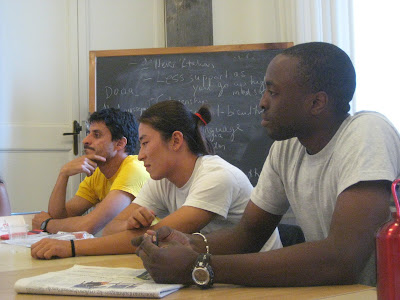I have been tasked with writing the last blog for our program, but where to start?
First off, a summary of my assigned date ( Friday Sept 19th 2008). Well we didn't have class so that last day consisted of packing, last minute sight seeings, shopping, and getting ready to go. A few people flew out that day, but the majority of us had our flights on Saturday, and since we were kicked out of our apartments, a few of us had a slumber party at the airport:


Now to the deep stuff:
To sum up the exploration seminar in one word....Amazing.
I personally learned so much about the world and how I fit into the bigger picture through my experiences during this past month. Through meeting the many guests we heard from, through the readings, and through discussions with my classmates i gained a greater understanding of Italy and thus a greater perspective on the world.
When the program first started, all I knew about the immigration and education systems in Italy were from what I read in our class readings. When we first started visiting NGO's and government organizations it seemed like there was a general feeling of hopelessness and frustration with a non-adaptive government. When we started talking with immigrants and volunteering at the refugee center, it was sad to see how the challenges in navigating the immigration system were felt by real people. Hearing their stories and hearing about how they felt that they couldn't do anything to improve their situations was heartbreaking, especially coming from a country in which we're taught to fight for our rights. At this point i personally started feeling hopeless also, until we started going to the schools...




 Once we started visiting the schools, I started to see, and find inspiration in the work that the teachers and parents were doing to improve the situation for the children. Talking to a few of the parents from the Parent Association at the Di Donato School we learned about the commitments in time and money they make to getting their kids to interact and learn about each other. At our first visit to the Manin school we learned about how the teachers were using diversity as a resources, and taking their students on visits to museums to learn to appreciate their differences. And at the Iqbal Masih school we saw how they allowed their students to teach others about their culture, and how they actively opposed and protested against the government to fight for the needs of the children. These visits taught me a lot about how change has to often occur from the ground up, and also that it's the people on the ground who really understand and fight to improve what seem to be hopeless challenges.
Once we started visiting the schools, I started to see, and find inspiration in the work that the teachers and parents were doing to improve the situation for the children. Talking to a few of the parents from the Parent Association at the Di Donato School we learned about the commitments in time and money they make to getting their kids to interact and learn about each other. At our first visit to the Manin school we learned about how the teachers were using diversity as a resources, and taking their students on visits to museums to learn to appreciate their differences. And at the Iqbal Masih school we saw how they allowed their students to teach others about their culture, and how they actively opposed and protested against the government to fight for the needs of the children. These visits taught me a lot about how change has to often occur from the ground up, and also that it's the people on the ground who really understand and fight to improve what seem to be hopeless challenges.


Walking away from this seminar I personally feel very empowered to help to improve the situation for immigrants here in the states. Seeing the challenges immigrants face in Italy has made me interested in learning about how that process here in the U.S. is similar or different. Also, I've realized that we all, regardless of our backgrounds, have something to contribute to this effort.
All in all this was a very eye opening seminar. I greatly enjoyed meeting and getting to know everyone in the program. I know that walking away from this we've all changed for the better and I hope that we all take the knowledge we've gained through this program and put it in action to help others.
Ciao,
Brukab



















